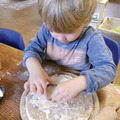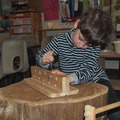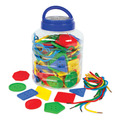in a well-planned learning environment - can offer lessons for all of
us. Marianne Sargent takes a look.

An enabling environment that encourages children to fulfil their potential is at the heart of the Montessori philosophy. Edwin Mortimer Standing, close long-time colleague of Maria Montessori, offers a natural analogy for the underlying ethos of Montessori practice: 'When we look at a hive of bees, what do we see? We behold a society in which the whole energies of the adult population are devoted, with unremitting self-sacrifice, to the task of building a prepared environment for the coming generation.'
The Montessori method involves nurturing the whole person, emotionally, socially, physically, spiritually and intellectually. Children play within a carefully planned learning environment that aims to foster life skills and help them develop confidence, independence and self-esteem.
CASE STUDY
Bishops Waltham Montessori School
Emma White, owner and manager of Bishops Waltham Montessori School near Winchester, says the prepared environment is fundamental. 'We make the environment child-centred to facilitate each child's needs. I come in a couple of hours before the children just to ensure it is beautiful, rich and natural for them,' she explains.
The school is very traditional and true to Montessori principles. The children experience a learning environment divided into five areas: practical life, sensorial, mathematics, language and literacy, and cultural understanding. These areas are laid out with specially designed materials that aim to nurture development and meet specific developmental needs.
'Each area has four shelves of materials that are arranged in tasks, from simple to complex, and laid out from left to right (to support pre-writing),' Miss White says. 'For example, a child will begin by pouring some lentil beans from one jug into another. Then as you move along the shelf they get a funnel with water to pour into vinegar pots. Then they have transfer something with tongs, then move chickpeas with tweezers.'
Self-reliance
 Miss White explains that rising three- to five-year-olds are taught in vertically grouped classrooms, where older children help and teach their younger peers. 'When a new child comes along, rather than the adult facilitating, the older children do the groundwork and show them what to do because they are already established. Younger children seem to value being taught by the older children in a lot of ways instead of an adult who may interrupt and dominate.'
Miss White explains that rising three- to five-year-olds are taught in vertically grouped classrooms, where older children help and teach their younger peers. 'When a new child comes along, rather than the adult facilitating, the older children do the groundwork and show them what to do because they are already established. Younger children seem to value being taught by the older children in a lot of ways instead of an adult who may interrupt and dominate.'
For this to work, the children need an easily accessible learning environment equipped with resources that support independence and self-reliance. Staff take a back seat and allow the children space to play and learn on their own and with their peers.
'Montessori teachers are called directresses because we direct and guide,' says Miss White. 'We know to be quiet and passive. In a lot of early years settings it is very adult-dominated even though it is meant to be child-led.'
She uses the cafe snack area as an example. 'The children have a water butt that they collect water from. They collect milk from the fridge and cereals and raisins from jars. They then wash their plates and put them on the side.' This teaches life skills and facilitates particular preoccupations or schemas, says Miss White. 'Someone who's two-and-a-half washes their plate for 20 minutes with repetition, which is a skill and a need.'
She adds, 'On the practical life shelf, we have dressing frames with zips, buttons, and hook and eyes. The children use these to practise self-care skills. They also have access to their own drawer, which contains sticky name labels. When they have done a piece of artwork they can take a label and stick it on their own work. Their name recognition comes really quickly and they've got such a sense of pride because they're putting their own name on their own work even though they can't write yet.'
 This emphasis on self-reliance even stretches to mathematical learning, where children use self-correcting equipment such as number rods and spindle boxes that help them to see at a glance if they have made a mistake and then put it right without help.
This emphasis on self-reliance even stretches to mathematical learning, where children use self-correcting equipment such as number rods and spindle boxes that help them to see at a glance if they have made a mistake and then put it right without help.
'The pink tower is another classic Montessori material,' adds Miss White. 'It practises visual discrimination: biggest, smallest, longest, shortest. We have miniature ladders, so when the children are building they can complete the tower instead of an adult completing it for them.'
Creative thinking
As well as teaching children independence, there is much emphasis on creative thinking and improvisation. When Miss White and colleague Scarlett O'Malley set up sister school Droxford Montessori, in Southampton, they made a concerted effort to furnish it with natural, reclaimed and recycled materials.
'We do it to show the children that you can be creative and we can chop and change things ourselves,' says Miss White. 'We sourced the wood for the shelves at Droxford and got a carpenter in the family to make them. We went to the charity shop and got old coffee tables and drilled holes to put wash bowls in for washing-up.'
An old mirror was turned into a chalkboard and discarded pub tables sanded down and made into small refectory tables. They asked a local tree surgeon for some large flat logs, sanded these down, added broom handles and turned them into small tables and stools.
Outside, they have recycled some wooden poles that were to be thrown out by the local scout group and used these to make a wigwam. Miss White's partner has also donated some large electrical cable drums that the children can roll about and use as tables.
Miss White says the Droxford school's rural setting makes it possible to teach the children outside in a beautiful and natural outdoor learning environment. The school has an allotment where the children grow their own vegetables, and a large garden area filled with open-ended green reusable resources such as pallets, large hollow blocks and garden trugs.
The children at Bishops Waltham don't have access to the same outdoor environment; however, Miss White explains how she mitigates this: 'The children wander in and outside as they please. We have a hard surface area set up every day with resources, which we adapt.
'The children are able to grow vegetables and keep pets and we all walk down to the village to get our snacks and food for the animals. We go outside in all weathers and we've also got a park next door that we walk to.
'I think I'm really lucky because all the girls here are so passionate, so you get all enthusiastic and you see how the children develop and how harmonious the environment is. You just think "What can we do next? What would they like? Where can we go?"'
BEST BUYS
There are various suppliers of Montessori resources in the UK and prices vary greatly. The following offer good-value resources that can be used in any setting to create an enabling environment.
Fostering independence
 Artful Dodgers supplies a range of frames that aim to help develop practical dressing skills, including shoe lacing, hook and eye fastening, safety pin fastening, press buttoning, zipping, lacing and Velcro fastening (£18.95 each) or as a complete set on a stand (£118.20). Also available are Lacing Apple and Lacing Cheese (£5.99 each) and Colossal Buttons (£4.64).
Artful Dodgers supplies a range of frames that aim to help develop practical dressing skills, including shoe lacing, hook and eye fastening, safety pin fastening, press buttoning, zipping, lacing and Velcro fastening (£18.95 each) or as a complete set on a stand (£118.20). Also available are Lacing Apple and Lacing Cheese (£5.99 each) and Colossal Buttons (£4.64).
Lakeland offers a selection of self-serve kitchen items, including an 8-litre Kilner Drinks Dispenser with tap (£29.99), a 3.9-litre Lock and Lock Cereal Dispenser (£6.99) and Oxo Good Grips Pop containers all with airtight but easy-to-open lids. Range includes a Cookie Jar (£12.99).
Absorbent Minds has a wide choice of child-sized cleaning equipment including a Child's Broom (£3.99), Waterproof Gloves (£4.99), Wooden Washboard (£19.99), Pump Spray Bottles (from £1.69) and Mini Clothes Pegs (£3.49).
Accessible furnishings
TTS Group supplies a Mobile Sink Unit with a hand-operated pump, 10-litre water supply tank and waste container (£139.95).
Cosy offers the Rustic Sink Crate Top (£18.99), a plank of wood with an inset bowl for setting on top of a crate.
If you want to emulate the natural Montessori ethos, Cosy also supplies a range of natural furnishings, including the Cosy Country Cafe Set (£115.95), consisting of a wooden table and set of four log seats.
Early Excellence has a lovely solid wooden furniture range including Closed and Open Shelving units (from £295), a Low-Level Shelving Unit (£315) and Double-Sided Unit (£415). It also has a range of mobile units (from £245).
Self-correcting maths
Absorbent Minds offers a Montessori Maths Starter Pack (£275.99) of number rods, sandpaper numerals, spindle boxes, number cards, beads for introducing decimals, a teens seguin board, a tens seguin board, coloured bead bars ('stairs') and a hundred board.
Alternatively, find a large range of Numicon resources including Numicon in the Nursery set (£114.95) and Numicon Starter Apparatus Kit (£274.95) from Early Years Resources.
For more maths resources, see pages 28-29.
MORE INFORMATION
- Absorbent Minds, www.absorbentminds.co.uk
- Artful Dodgers, www.artfuldodgers.co.uk
- Bishops Waltham Montessori, www.bishopswalthammontessori.co.uk
- Bringing the Montessori Approach to your Early Years Practice by Barbara Isaacs
- Cosy, www.cosydirect.com
- Droxford Montessori, http://droxfordmontessorischool.co.uk
- Early Excellence, http://shop.earlyexcellence.com
- Early Years Resources, www.earlyyearsresources.co.uk
- Lakeland, www.lakeland.co.uk
- Maria Montessori: her life and work by E M Standing
- The Montessori St Nicholas Charity, www.montessori.org.uk
- TTS Group, www.tts-group.co.uk.









